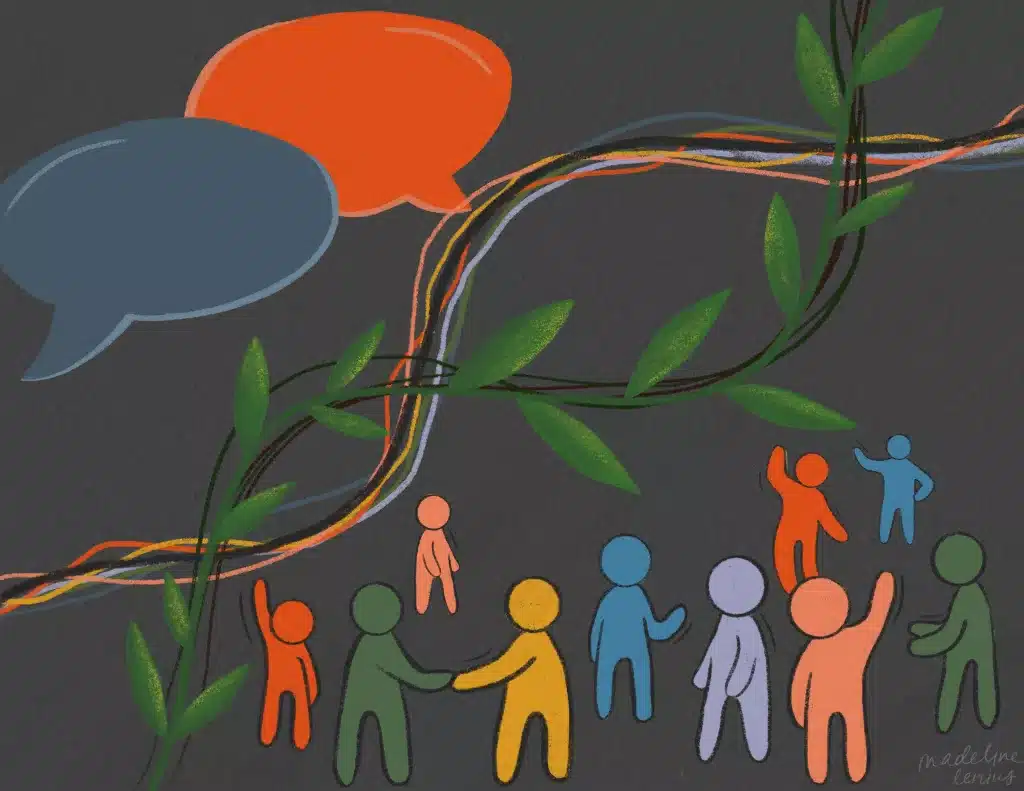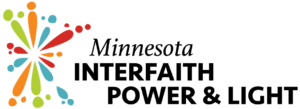
Unity Church Unitarian Engages in Truthful Healing
Story and art by MNIPL Intern Maddie Lenius
Unity Church Unitarian in St. Paul has a long history of social justice work. The congregation has many community outreach ministry teams working on education and action around particular justice topics. In 2022 – 2023, the Indigenous Justice and Act For The Earth teams collaborated to develop and facilitate a seven part truth telling and healing series on Indigenous and environmental justice. A goal of Unity’s community outreach ministry, and this series in particular, is to reflect on the intertwined nature of spirituality and justice.
“What are you doing and how are you making that come from your core, from your spirit, as opposed to something that’s intellectual? I explain it by saying, ‘Look, we’re just trying to make spiritual practice and social justice part of our DNA,’” Becky Gonzalez-Campoy, member of the Indigenous Justice team, said. “The idea was to have this not just be an intellectual exercise, but to then embody what we were learning… What do we do with this information? How do we learn more or connect with these organizations that are coming in? How do we tell the truth about what happened and what is happening? That was the first half. And the second half was about healing. First, how are the various Indigenous groups healing? Then, how do we as a largely white congregation take part in a healing process?”
Many members of Unity Church have relationships with Indigenous-led organizations and have been involved in direct action against pipelines and destructive agricultural practices. But after her involvement in Line 3 resistance, Jean Hammink, member of the Act for the Earth team, realized the need for more education within the majority-white congregation. Her idea was a series focused on the injustices affecting the environment and Indigenous people, the role of their community in perpetuating these injustices, and the potential for participating in the healing process.
“What I’ve come to understand is… if we have people we’re willing to sacrifice, particularly Brown and Black people, then we’ll always have Earth that we’re willing to sacrifice. We have to address the racism and what it’s produced in order to address climate change,” Jean said. “And then regarding the role of Indigenous justice and Indigenous people in climate change is, to me, they are a big part of the answer. Their relationship to the Earth, I think, could save us if we could come to understand it and internalize it. That’s our work to do and not their work to make sure we do… We can work on where Indigenous land is being violated… There’s a lot we can do to support what native people are trying to do as part of the answer. Every social issue has an interrelationship with antiracism work and climate justice work because it’s all intertwined.”
In partnership with other members of the Act For The Earth and the Indigenous Justice teams, Jean and Becky began developing the Truth Telling and Healing series. The planning team worked with Indigenous-led organizations including Healing Minnesota Stories, the Indian Land Tenure Fund, Dakota Wicohan, and Honor The Earth. The topics covered included Indigenous history in Minnesota, relationship to the land, the role of religion, Indigenous healing, land and reparations, honoring the treaties to save the Earth, and their own truth telling and healing. Participants joined in person and virtually, and the recordings and resources are still available on Unity’s website.
“I think probably the thing that I feel the strongest about is the number of people that we touched… the cumulative numbers of individuals that attended various, one or more sessions. I was appreciative of that number,” said Helen Pohlig, member of the Indigenous Justice team. “I’m really pleased about that because it at least opened the door to greater awareness for a fair number of people, both within Unity, and I think there was some participation outside of the church as well.”
One of the most impactful experiences was learning local history, especially the story of the land which Unity’s building now occupies. One of the series speakers was MNIPL’s Jessica Intermill, who conducts land history consulting, helping households and organizations understand the history of their land.
“We wanted to know specifically, who was on this land? How did it get to be here in our hands?” Becky said. “She came in… did research and said, ‘Here are the treaties that put this in place and here are the steps of how this land went from the Dakota to now Unity.’ Because the point we’re trying to drive home to people is we really mean what we’re talking about. This isn’t just an abstract concept.”
Since the series, the congregation has seen an increase in engagement with the community outreach ministry teams, including a new member who joined Indigenous Justice.
“One of the people that attended every single session is now part of our leadership team. It’s something that he’s now committed to,” Helen said. “There are a couple people who I think, not just their awareness, but their willingness to step up has been more solidified.”
The series was an opportunity for learning and deepening in understanding, but in the future, the leaders are setting the goal to further prioritize engagement and relationship at similar events.
“One of the people that I talked to is [Iyekiyapiwin] Darlene St. Clair. She was our first presenter on history and she basically said to focus on relationships. And she also said you’ve got to give people the opportunity to talk about this. You’ve got to find ways of doing reflection and holding self and others accountable,” Jean said. “What I would have done differently is built in more process time for the participants… I would have maybe pushed a little harder to try and build that in.”
Every week, Unity hosts an educational opportunity as part of their “Wellspring Wednesday” program. Offering the Truth Telling and Healing series during this time made the series very accessible, but it also created a time constraint that made reflection challenging.
“Unitarians typically love learning. Getting people to act and get out of their comfort zones is a little more challenging,” Becky said. “I’ve always thought if I just provide you with ideas of what you can do, you will go do this. That’s not how that works. You have to arrange opportunities for people to have someone else to go with them… I realize that there’s a fear factor. We don’t all share the same comfort level, we’re not all coming from the same place in our journey. And so it’s best to have a companion. And the interesting thing is when you do something with someone else, you then can have a conversation about it and hold each other accountable.”
In addition to inviting others to join in your learning and action, sharing your own story is another way to engage community members which is grounded in authentic relationship.
“What I try to do is say, ‘This is what I’m learning, this is how I’ve been thinking about this, this is what I’ve just been exposed to.’ Just sharing,” Jean said. “Make it be okay for people to be where they are and just say, ‘This is where I am, this is what I’m thinking,’ and then invite people to join in talking about that.”
Everyone’s background and comfort level is unique, so we don’t all need to approach this work in the same way. In fact, justice work is strengthened by diversity. As long as your engagement is intersectional and following the example of those with expertise and lived experience, the most important step is just getting involved.
“There’s a fear of making mistakes. I have said many times as a former swimmer, put on that lifejacket, jump in, the water’s wet, it’s gonna happen, just get in. If you don’t get in it’s worse, we’ll do this together,” Becky said. “But that is the key: we will do this together and that’s also something I’d say I’ve learned from these efforts. It’s not just serving, it’s sitting down to have a meal together, so to speak.”
Do you have a story to share?
Your community's climate actions are inspiring! Share your story with others ...
